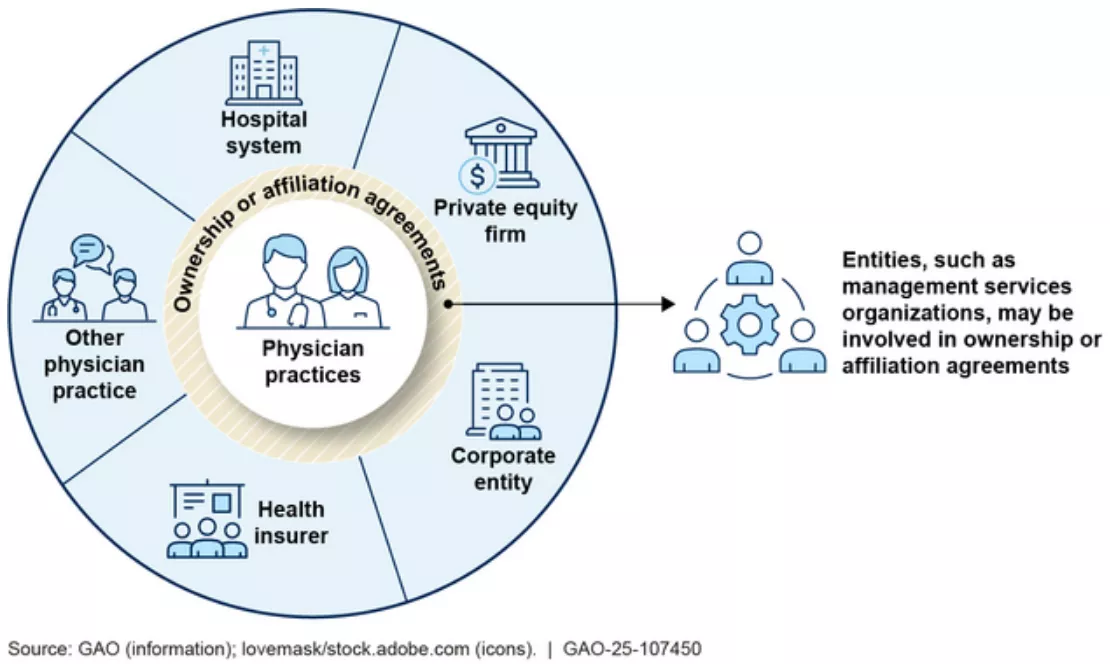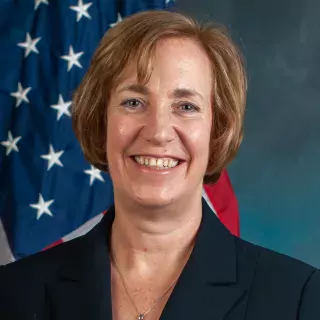Health Care is Becoming More Consolidated—Including Physicians. What Effect Is It Having?
Health care in the United States is becoming increasingly consolidated—raising concerns that decreased competition could increase costs or reduce quality or access.
The consolidation trend includes physicians, who have left or sold their private practices to partner with or work for hospitals, health insurers, and corporate entities.
Today’s WatchBlog post looks at our new report on trends in physician consolidation and its potential effects.
Image

Physicians are leaving private practice, where are they going?
Not so long ago, most physicians worked in private practice. In fact, just over a decade ago, 60% worked in private practice, according to one estimate. But recently, that number has dropped to less than half (42%).
Where did these doctors go? About half of doctors have moved to hospitals. Hospital systems are increasingly buying up private practices. One study showed that the share of physicians consolidated under a hospital system increased from 29% in 2012 to 47% in 2024. Another study found that this has occurred the most in the Midwest.
Some private practices have merged with private equity firms. This was more prevalent in metropolitan areas. Doctors also moved to other corporate entities or health insurers.
This trend may introduce new challenges for the remaining private practices, leading to even more consolidation.
Entities that May Consolidate with Physician Practices
Image

Why are physicians moving away from private practices? As you can guess, running a private practice can be expensive and administratively burdensome.
Physicians may be looking for relief. Consolidating or affiliating with hospital systems or other entities may prevent private practices from closing and provide other benefits. For example:
- Higher reimbursement rates. Physicians in private practices may find it more difficult to negotiate contracts and payments with insurers. To enhance negotiating power, they may sell or affiliate their practices with others.
- Practice Expenses. Maintaining a private practice can be difficult as practice expenses increase. Consolidating with other entities can reduce these expenses or provide access to costly resources like information technology systems.
What does consolidation mean for health care spending and quality of care?
The trend toward increased consolidation could cost patients and the federal government more. Prices could vary by insurance type, place of service, physician specialty, and geography. For example, when more services are provided in hospitals, spending and prices typically increase.
There is also some evidence that physician consolidation involving private equity firms can lead to price increases for private insurance. However, we don’t know what happens to spending or prices when physicians join with health insurers.
But while you may be paying more for care, the quality of care you receive may be the same or even decline when physicians join a hospital system. There is limited research on how physicians consolidating with health insurers or private equity firms would affect costs and spending. Similarly, not a lot is known about how access to care would be affected when physicians consolidate with any type of entity.
To learn more about physician consolidation and its effects on health care costs and quality of care, read our full report.
- GAO’s fact-based, nonpartisan information helps Congress and federal agencies improve government. The WatchBlog lets us contextualize GAO’s work a little more for the public. Check out more of our posts at GAO.gov/blog.
- Got a comment, question? Email us at blog@gao.gov.
GAO Contacts
Related Products

GAO's mission is to provide Congress with fact-based, nonpartisan information that can help improve federal government performance and ensure accountability for the benefit of the American people. GAO launched its WatchBlog in January, 2014, as part of its continuing effort to reach its audiences—Congress and the American people—where they are currently looking for information.
The blog format allows GAO to provide a little more context about its work than it can offer on its other social media platforms. Posts will tie GAO work to current events and the news; show how GAO’s work is affecting agencies or legislation; highlight reports, testimonies, and issue areas where GAO does work; and provide information about GAO itself, among other things.
Please send any feedback on GAO's WatchBlog to blog@gao.gov.



